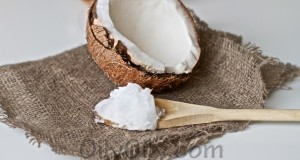
Photo credit: flickr
Safflower oil is derived from the seeds of the safflower plant. This oil is recommended by the American Heart Association as a substituent of a healthy diet. Sallower oil nutrition facts show that safflower oil contains unsaturated fats, so it doesn’t lead to cholesterol rise. Safflower oil is used in its raw form for salad dressings and as cooking oil for roasting, baking and stir-frying.
Contents
Type of fats
Safflower oil is divided into two types, based on the kind of predominating fat. The traditional safflower oil contains mostly polyunsaturated linoleic acid, or omega-6 fat. The fat composition includes 10.1 g polyunsaturated fat and 1.9 g monounsaturated fat per tablespoon.
High-oleic acid safflower oil is rich in monounsaturated fatty acid, or omega-9 fat. Every tablespoon contains 10.4 mg oleic acid and 1.7 mg polyunsaturated fat. This type of safflower oil and olive oil are alike in composition and possess the same heart benefits. Compare safflower oil vs olive oil.
Caloric value. One tablespoon of safflower oil includes 120 calories or 13.6 g of fat.
SEE ALSO: What is Safflower Oil Made from?
Safflower oil ingredients
There is no protein, fiber, carbohydrates or cholesterol in safflower oil. 1 tablespoon of safflower oil has vitamin E, or alpha-tocopherol, in the amount of 4.6 mg. It makes up about 31% of the recommended daily intake. The benefits of vitamin E is caused by its antioxidant properties: it helps the immune system, fights free radicals, helps prevent damage harmful substances formed in the process of digestion can cause.
Phytosterols
Safflower oil also contains phytosterols, steroid compounds that may help lower a cholesterol level. Phytosterols assist in joints health and boost the immune system. According to the recommendations of FDA, the dose of phytosterols needed for the healthy heart is 0.8 g per day, divided into two servings. Safflower oil has 60 mg of phytosterols in every tablespoon.
RELATED: Hemp Seed Oil Nutrition Facts You Might Be Interested in
Safflower oil and cholesterol
Cholesterol is needed for your body to produce vitamin D, digest food and create some types of hormones. Too high level of cholesterol, vice-versa, raises the risk of coronary heart disease and heart strokes. When you use safflower oil cholesterol levels are not increased because safflower has heart-healthy fatty acids.
Moreover, safflower oil is a source of phytosterols that help lower cholesterol. They prevent cholesterol absorption by the small intestine. According to the Cleveland Clinic phytosterols assist in lowering LDL cholesterol levels by 6-15%. Consume also fish oil to lower cholesterol level.
Considerations
Despite the beneficial safflower oil nutrition facts, you should consume this oil in moderation as any other oil. If you prefer traditional linoleic safflower oil, don’t consume it too often as our diet is already excessively high in omega-6 fatty acids.
 Oilypedia.com – Benefits And Uses Of Supplemental and Essential Oils
Oilypedia.com – Benefits And Uses Of Supplemental and Essential Oils 


